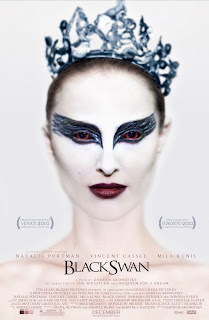Black Swan
 I was blown away by Darren Aronofsky's Black Swan, which is right up there with The Social Network and Toy Story 3 for my choices as best film of 2010 (I've still got some more to see). It manages to be both visually beautiful and disturbingly scary; it's as if Wes Craven and PBS Great Performances were mixed together.
I was blown away by Darren Aronofsky's Black Swan, which is right up there with The Social Network and Toy Story 3 for my choices as best film of 2010 (I've still got some more to see). It manages to be both visually beautiful and disturbingly scary; it's as if Wes Craven and PBS Great Performances were mixed together.This film is very much a companion piece to Aronofsky's film of two years ago, The Wrestler. Both films detail the physical and emotional torment that a certain kind of performer goes through. But while The Wrestler's Randy "the Ram" Robinson is struggling to hang on to his career, Nina Sayers (Natalie Portman) is at the onset of hers. She is a member of the chorus at a New York ballet company when the director (Vincent Cassel) taps her to play the lead in a production of Swan Lake. The catch--he wants her to play both parts: the virginal White Swan, and the seductive and evil Black Swan.
Portman's Nina isn't particularly emotionally healthy at the beginning of the film. She's infantilized by her grasping mother (Barbara Hershey), her bedroom full of stuffed animals. She's sexually frigid, something that gives Cassel pause about casting her as the Black Swan (he advises her to masturbate). But as Nina struggles to get into the role, and worries about the ambition of another company member (Mila Kunis), she starts to exhibit certain physical characteristics--scratches on her back, bleeding fingers, webbed toes. It seems that she is undergoing the same problem that Odette in Swan Lake is going through--she's turning into a swan.
All through the film we're not quite sure what we are seeing. Is it all in Nina's mind? Is the doppelganger she sees around the city real, or is it just Kunis? And what's with all the reflective surfaces? They exist in almost every scene, whether they are the ubiquitous mirrors of a ballet rehearsal studio, a typical bathroom, or the windows of a subway car, Nina is always looking at herself, and occasionally what she sees doesn't comport to physical law.
I am no balletomane--I've been to the ballet once, to see Prokofiev's Romeo and Juliet (a favorite of mine)--but after seeing Black Swan I'm keen to go, and of course I have to see Swan Lake (right now both New York City ballet companies are mounting productions of The Nutcracker, of course). Having spent more than a few years in a theatrical arena, the scenes of backstage skulduggery ring true (Winona Ryder briefly and vividly appears as the once-great star who's tossed out like yesterday's newspaper). The physical stuff of a ballerina also seems authentic--the split toenails, the eating disorders, the balance of muscular strength and emotional fragility.
As Nina cracks up, we are led to the opening night performance, which for my money is the sequence of the year. The direction, editing (by Andrew Weisblum), and photography (by Matthew Libitique) are top-notch. The culmination is a tour de force of music and imagery, and my palms were sweaty with suspense, a rare thing for this jaded movie-goer.
Portman, who is certain to be Oscar-nominated for her role, gives a bravura performance. As with Mickey Rourke in The Wrestler, she throws her body into the part. But as with Rourke, there's more to it than that--Portman must have been a wreck after going through this film, as almost every emotion was tapped to the core. I think of one moment in particular, when she calls her mother to tell her she's gotten the part of Swan Queen--her face is a perfect picture of joy, given way to tears. It's a magnificent performance.
All of the cast are excellent. Hershey, her face a rictus of plastic surgery, is eerily controlling, while Kunis, Cassel, and Ryder all excel (Ryder's role of the has-been seems almost cruel in its real-life parallels).
My greatest take-away from this film is that it's more than just about one ballerina's psychological breakdown. Anyone who has taken the stage in any form can empathize--there's a certain terror involved, whether one is telling jokes, acting, or playing guitar. Nina's quest for perfection, and to please her director and audience, is an impulse as old as theater and dance itself, and is exquisitely rendered here by Aronofsky.
My grade for Black Swan: A


Comments
Post a Comment